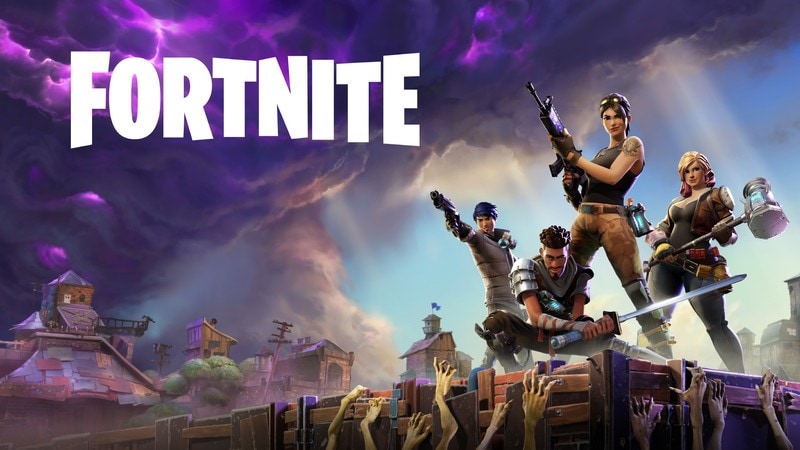When the University of Maryland-Baltimore County basketball team pulled off the greatest upset in NCAA history, player Nolan Gerrity had the perfect metaphor for what he was feeling.
“It’s like your first Fortnite victory, honestly,” he told reporters.
For those out of the know, it was a puzzling statement. But Gerrity’s example made perfect sense to the 150 million people worldwide who have launched the video game Fortnite into an international obsession this year.
Fortnite has been described as a cross between Minecraft and a shooter game. Survival is the name of the game. Players fight each other, making it through a night of zombies, or surviving to the end of a massive battle, and they use the landscape around them to find materials to build shelters.
The game launched in July as a console and PC game, but the Fortnite franchise has steadily picked up steam as it added new playing modes. Its most buzzed-about mode is the “battle royale,” a free, massive 100-person fight to the death that only allows for one survivor. That mode was released as a stand-alone game in September.
That mode has helped shape Fortnite, the phenomenon. It’s become the most-watched game on Twitch, the Amazon.com-owned site centred on streaming games, and on YouTube Gaming. (Amazon chief executive Jeff Bezos owns The Washington Post.) According to gaming data firm Newzoo, Fortnite alone made up 12.8 percent of all traffic to those platforms in February. Fortnite’s iOS mobile app – which launched in March and was an invite-only game until Monday – climbed to the top of charts in the United States and a dozen other countries within 12 hours of its release, according to app analytics firm App Annie. The Android app is on its way.
The hype hit a fever pitch when hip-hop star Drake dropped into a session with “Ninja” (a.k.a. Tyler Blevins), a professional gamer and streaming star, on March 14. The two drew a record-breaking 628,000 concurrent viewers on Twitch.
It’s been a great “crossover” moment for the gaming world into the mainstream, with analysts comparing it to other big titles such as 2004’s World of Warcraft and 2009’s Minecraft that sparked a frenzy outside of the core gaming world.
“It’s not just the biggest game of the year, it’s the first game we’ve seen since Minecraft that’s had this kind of appeal,” said Mat Piscatella, an analyst at NPD Reasearch who closely tracks the game industry. “The upside potential is astronomical.”
Gaming itself has become more mainstream, with industry estimates saying 65 percent of American households have at least one person who plays games for three hours per week. But it’s rare to see a single game take hold of the conversation in the way that Fortnite has, analysts said.
Fortnite’s appeal as a franchise is threefold, analysts said. For one, it’s free-to-play, giving it an edge over similar games such as “Player Unknown’s Battlegrounds.” PUBG was the first to popularise the battle royale genre. But it asks players to pay before they play, whereas Fortnite is free to download and makes its money from selling in-game items.
Another aspect of Fortnite’s success is the way it has found traction on social media. The game’s developer, Epic Games, peppers Fortnite with cultural references – characters can do a dance from the 2000s TV show Scrubs – and has kept releasing new cosmetic updates and twists. (Right now, the Fortnite world is in fits over what an ever-growing comet in the sky portends.)
Finally, and perhaps most importantly, it’s a high-quality game, which can be rare among free titles. It’s fun and simple. Fortnite Battle Royale’s last man standing format is easy to understand at a glance. Forming a strategy is smart, but not a prerequisite for victory. Its cartoonish graphics make its violence easier to stomach, analysts said. All of that makes it the perfect title at a time when games are increasingly trying to tap into the market for new players through streaming.
“The design is important,” said Gene Munster, managing partner at venture capital firm Loup Ventures. “It captures a balance, where a novice can be entertained rather than confused.”
It’s hard to know exactly how much money Fortnite is making. Epic Games is a private company and, therefore, doesn’t have to publish financial records. Estimates from research firm SuperData put Fortnite’s February revenue at $126 million.
But analysts expect that number is poised to grow as Epic moves its megahit over to mobile – a much broader but often more fickle audience.
It’s too soon to tell how mobile will change Fortnite though, Piscatella said. Epic dropped a mobile version of the game for iOS, as an invite-only test, on March 12. Within days of the app’s first tests, it got a real sign of its popularity, he said: how much it annoyed schools.
Students and teachers quickly complained that so many kids were playing Fortnite in class that school WiFi networks struggled to keep up.
It’s hard to say how long that popularity will last, but its spike, for now, has earned it the distinction – like fidget spinners, silly bands and Tamagotchi – of being banned by several schools.
© The Washington Post 2018
If you’re a fan of video games, check out Transition, Gadgets 360’s gaming podcast. You can listen to it via Apple Podcasts or RSS, or just listen to this week’s episode by hitting the play button below.



